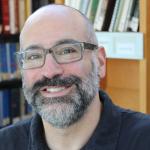By Gregory
Too much of contemporary spirituality and theology is comprised of talking.
The central Jewish prayer is the Shema – which is a command to listen, and which may be translated as “Pay attention, those who wrestle with the Eternal, the Eternal is our God, and the Eternal is One and reality is interconnected.”
What do we listen to?
First, we listen to nature – the cycles of agriculture, the seasons, the tides, the moon, and so on. Here we find the basic patterns of life, death, renewal, rebirth, growth, and regeneration.
Second, we listen to our own nature – and uncover the moral truth about humanity – the imperative to pursue justice, the necessity of kindness, the goodness of compassion, the drive that each of us has toward holiness – which best translates as fullness, wholeness, and thriving.
Third, we listen to the broader patterns of order, regularity, constancy, and cooperation that keep the unified system of life and reality flowing. In these patterns we can find existential meaning for our lives.
Fourth, we listen to the words of our ancestors, who also listened to nature and heard in it the voice of the Divine. Their hearing lead to their writing, thus generating Torah. We listen and engage with their writings – entering into the myths, reflecting on the sacred wisdom, and sifting through our modern thinking and their ancient insights.
Fifth, we listen to each other – especially those in our chosen communities, our teachers, authors, mystics, and prophets. We listen to what they have heard in the above. We listen to their insights. We listen to how the Voice of the Spirit is leading through them. Our listening is best done in the context of community and tradition.
The notion of listening is employed metaphorically – the goal being to strip away the unnecessary filters that block more accurate perceptions of nature, including our own human nature. Awakening to the world as it really is and living accordingly is the heart of spiritual realism.
Unfortunately, most of us go through life distracted or even lost in fantasies that have little to no correspondence to the way the world truly is. We also get lost in our own circumstances, the busyness of modern daily life, the complexities of our culture and society, the many messages that bombard us daily (marketing, religion, politics, interest groups, et al), and become subject to the various ideologies (isms) that eventually leave us deluded and blind to the true nature of reality.
The antidote is a combination of simple living, meditation, insight, observing nature, intellectual clarity, self-honesty, and courage – all that can aid us in living awake to the truth. In this sense, spiritual growth is a matter of uncovering new depths rather than attaining new heights – for meaning and sacredness resides in this world, not in another.
The process of listening is progressive.
Rabbi Nachman suggests that the new Torah to come through for us in listening will be a Torah of hesed, of loving-kindness (Likkutei Moharan 13). While the tradition says that the Torah we originally received at Mount Sinai was a Torah of law and judgment (gevurah, the dynamic opposite of hesed), Reb Nachman encourages us to open ourselves and listen for a Torah of hesed/loving-kindness instead.
The notion of listening presupposes that there is a still, clear, but quiet voice that permeates nature. Like the burning bush, or the whisper of reality that Elijah hears in Kings, we find the voice of the Divine in nature, in the wilderness, where Torah is given.
That voice, that presence, in essence, commands us to order our lives in a certain way. That voice bespeaks a presence that underlies it. This experience of being commanded is the root of the Jewish notion of Mitzvoth. It is the foundation for all Jewish spirituality.
Humans experience the capacity of being called/commanded by something beyond ourselves, something that both speaks to our nature and is yet embedded there. In moments of quiet honesty, we find ourselves with a given orientation – and that orientation offers itself up as an approach to our better selves – it is the voice of our own objective nature calling us toward fulfillment. We understand this command of our own nature as the foundation of morality and religious practice.
The presence that underlies that voice in nature is what I call God.
Is this a God who gives out gifts? No. Is it a God who hears prayers? I’m not sure. (I pray, even for healing, for I believe that uniting and offering our intentions to the Eternal sanctifies them, focuses them, and causes no harm. This is not magical thinking. This is an expression of love.)
Does such a God deserve worship? I’m not sure. But such a God definitely deserves that we align our lives, our best efforts, and our hearts and minds to its patterns of goodness, mercy, cooperation, and life.
In many ways, the Jewish God is an anthropomorphized Tao, a human projection of the Ground of Being. But that ground, that eternal still point is worthy of my attention – and my submission.











